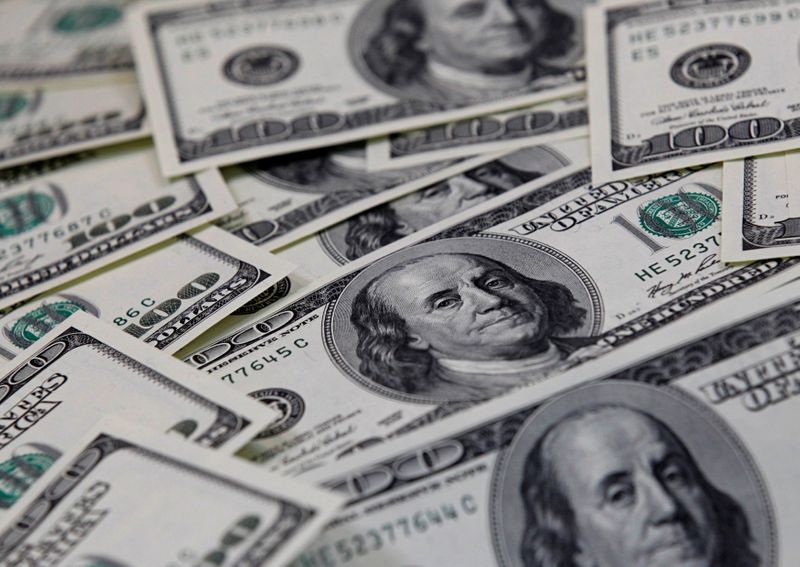By Kevin Buckland and Sagarika Jaisinghani
TOKYO (Reuters) - The U.S. dollar rose on Wednesday, clawing back some of the losses sustained overnight, as U.S. yields found a floor following their drop from one-year highs.
Riskier currencies including the Australian and New Zealand dollars retreated after logging big gains on Tuesday. Bitcoin turned lower after earlier topping $55,000 for the first time since Feb. 22.
The euro was 0.2% lower at $1.18815 after bouncing off a 3-1/2-month low of $1.18355 on Tuesday.
Against the yen, another traditional safe-haven currency, the greenback traded 0.3% higher at 108.780 yen, following its retreat from a nine-month top of 109.235.
"Yesterday, the dollar fell across the board as U.S. Treasury yields slipped after the continued rise since the beginning of this year. This morning, the yields have stopped falling so those who missed out on buying the dollar when it was rising, they saw the opportunity to buy it," said Masafumi Yamamoto, chief currency strategist at Mizuho Securities.
But he added, "the rebound in the dollar is not that big today."
The dollar index has closely tracked a surge in Treasury yields in recent weeks, both because higher yields increase the currency's appeal and as the bond rout shook investor confidence, spurring demand for the safest assets.
The benchmark 10-year Treasury yield stabilised around 1.54% on Wednesday in Asia after a three-day drop from a one-year high of 1.6250%.
The dollar index strengthened about 0.2% to 92.147 in Asia on Wednesday, after falling back sharply from a 3-1/2-month high of 92.506 overnight.
Bond investors have been selling on bets that a faster-than-expected economic rebound would spark a surge in inflation, with President Joe Biden expected to sign a $1.9 trillion coronavirus aid package as soon as this week.
Many analysts still expect the dollar to weaken over the course of this year, but the speed of recent gains has forced some to adjust their views.
Westpac, which last week was talking about selling the dollar index into 91, now sees it reaching as high as 94.50 before resuming last year's downtrend as the rest of the world closes the gap with the U.S. economic recovery.
"Global reflation is alive and well, and Europe will get her vaccination act together at some point too," Westpac strategists wrote in a note.
"A continuation of the global recovery ... should see commodity currencies outperform."
The Aussie dropped 0.4% to $0.7684 after jumping 1% overnight, as a top central banker rebuffed market chatter about early rate increases, helping pull local yields lower. [AUD/]
New Zealand's kiwi slipped 0.4% to $0.7146 following a 0.8% increase on Tuesday.
In cryptocurrencies, bitcoin rose as high as $55,855 on Wednesday before dropping back to $53,552.87. It hit a record high of $58,354.14 on Feb. 21.
========================================================
Currency bid prices at 0425 GMT
Description RIC Last U.S. Close Pct Change YTD Pct High Bid Low Bid
Previous Change
Session
Euro/Dollar $1.1881 $1.1901 -0.17% +0.00% +1.1904 +1.1878
Dollar/Yen 108.8000 108.5100 +0.27% +0.00% +108.8300 +108.5250
Euro/Yen 129.26 129.10 +0.12% +0.00% +129.3100 +129.0700
Dollar/Swiss 0.9298 0.9280 +0.20% +0.00% +0.9301 +0.9279
Sterling/Dollar 1.3868 1.3889 -0.16% +1.50% +1.3892 +1.3861
Dollar/Canadian 1.2664 1.2640 +0.17% +0.00% +1.2667 +1.2635
Aussie/Dollar 0.7685 0.7721 -0.46% +0.00% +0.7719 +0.7677
NZ 0.7147 0.7176 -0.39% -0.46% +0.7182 +0.7143
Dollar/Dollar
All spots
Tokyo spots
Europe spots
Volatilities

Tokyo Forex market info from BOJ